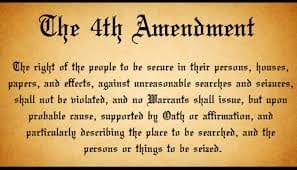The Fourth Amendment to the United States Constitution has three main purposes. First, it protects the person, the home, and a person’s belongings. Second, it prohibits unreasonable searches and seizures by the government. Lastly, it requires search warrants based on probable cause that specifically describe the place to be searched and the items to be seized. If evidence is illegally obtained, in violation of 4th Amendment protections, the Exclusionary Rule will prevent that evidence from being used against you in court. Be aware, though, there are many exceptions to the warrant requirement and the Exclusionary Rule. That leads to the next logical question . . . what is the analysis used to determine whether the government conducted a lawful search and seizure? If they did not, can the evidence obtained be excluded or “suppressed?” The following flowchart can help potential clients and interested persons conduct their own legal analysis.
* * * * * * * * *
FIRST, WAS THERE PROBABLE CAUSE?
Was there a BELIEF that someone had committed OR was committing a crime, OR that specific items connected with a crime were in a certain place? → If NO → Then there was no probable cause.
↓
If YES
↓
Then was that belief REASONABLE? In other words, would an unbiased third party objectively find the belief reasonable? → If NO → then there was no probable cause.
↓
If YES
↓
Then probable cause existed and the police satisfied the first prong of the legal analysis.
* * * * * * * * * *
NEXT, WAS THERE A LEGAL WARRANT UNDER 4TH AMENDMENT PROTECTIONS?
Did the search warrant affidavit prepared by the police show PROBABLE CAUSE existed? → If NO → Then the warrant was not legal.
↓
If YES
↓
Was the probable cause shown under the police officer’s OATH or AFFIRMATION? → If NO → Then the warrant was not legal.
↓
If YES
↓
Did the search warrant affidavit DESCRIBE in detail the PLACE to be searched and the PERSON or THINGS to be seized? → If NO → Then the warrant was not legal.
↓
If YES
↓
Then the warrant was legal and the police satisfied the second prong of the legal analysis.
* * * * * * * * * *
FURTHER, WILL THE EXCLUSIONARY RULE KEEP THE EVIDENCE OUT OF COURT?
Was the evidence obtained in VIOLATION of the Fourth Amendment? → If NO → Then the evidence is admissible and can be used in court.
↓
If YES
↓
Does the situation fall within an EXCEPTION to the warrant requirement? → If YES → Then the evidence is admissible and can be used in court.
↓
If NO
↓
Then the evidence is not admissible and cannot be used in court.
* * * * * * * * * *
LASTLY, DOES AN EXCEPTION TO THE WARRANT REQUIREMENT REGARDING 4th AMENDMENT PROTECTIONS APPLY?
Was there valid CONSENT to the search? → If YES → It is an exception and the evidence can be used in court.
↓
If NO
↓
Was the item in PLAIN VIEW? → If YES → It is an exception and the evidence can be used in court.
↓
If NO
↓
Was the evidence found in a legal VEHICLE SEARCH? → If YES → It is an exception and the evidence can be used in court.
↓
If NO
↓
Was the item found in a legal ADMINISTRATIVE INVENTORY SEARCH? → If YES → It is an exception and the evidence can be used in court.
↓
If NO
↓
Was the evidence ABANDONED PROPERTY? → If YES → It is an exception and the evidence can be used in court.
↓
If NO
↓
Was the evidence found in an OPEN FIELD? → If YES → It is an exception and the evidence can be used in court.
↓
If NO
↓
Were the police acting in GOOD FAITH, meaning they acted under an OBJECTIVE belief that what they were doing was constitutional? → If YES → It is an exception and the evidence can be used in court.
↓
If NO
↓
Then evidence was obtained unlawfully under 4th Amendment protections and the exclusionary rule applies. The evidence cannot be use in court.
Stephen Gustitis is a criminal defense lawyer in Bryan-College Station. He is Board Certified in Criminal Law by the Texas Board of Legal Specialization. He is also a husband, father, and retired amateur bicycle racer.
Related Posts:
A Beginner’s Course in Search and Seizure Law
How Does Evidence Get Excluded From Court?
Ignorance of the Law Can Now Help the Police!
What Are the Issues in a Consent to Search Case?
Seven Ways a Criminal Attorney Can Help You



